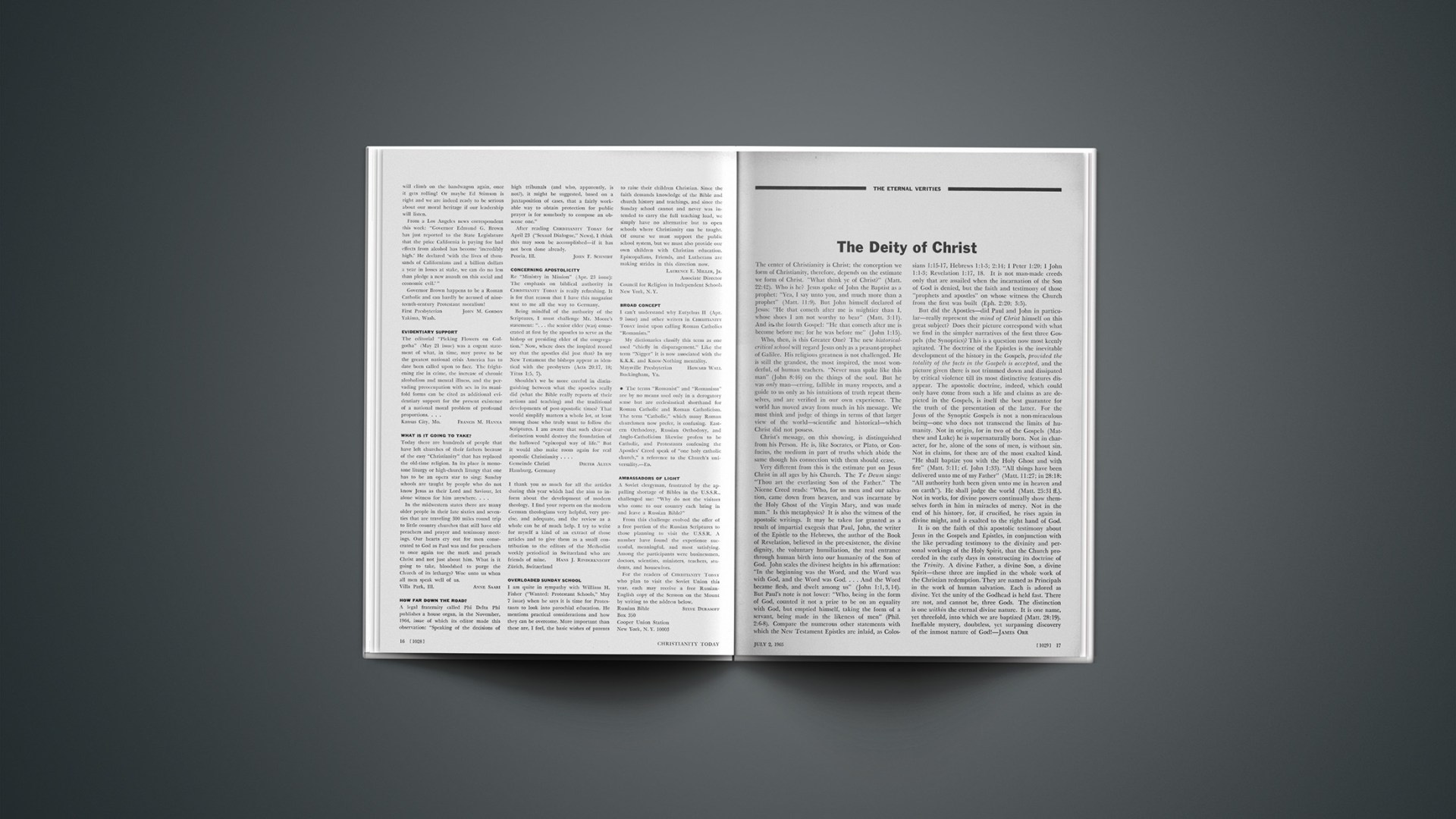The Deity of Christ
The center of Christianity is Christ; the conception we form of Christianity, therefore, depends on the estimate we form of Christ. “What think ye of Christ?” (Matt. 22:42). Who is he? Jesus spoke of John the Baptist as a prophet: “Yea, I say unto you, and much more than a prophet” (Matt. 11:9). But John himself declared of Jesus: “He that cometh after me is mightier than I, whose shoes I am not worthy to bear” (Matt. 3:11). And in the fourth Gospel: “He that cometh after me is become before me; for he was before me” (John 1:15).
Who, then, is this Greater One? The new historical-critical school will regard Jesus only as a peasant-prophet of Galilee. His religious greatness is not challenged. He is still the grandest, the most inspired, the most wonderful, of human teachers. “Never man spake like this man” (John 8:46) on the things of the soul. But he was only man—erring, fallible in many respects, and a guide to us only as his intuitions of truth repeat themselves, and are verified in our own experience. The world has moved away from much in his message. We must think and judge of things in terms of that larger view of the world—scientific and historical—which Christ did not possess.
Christ’s message, on this showing, is distinguished from his Person. He is, like Socrates, or Plato, or Confucius, the medium in part of truths which abide the same though his connection with them should cease.
Very different from this is the estimate put on Jesus Christ in all ages by his Church. The Te Deum sings: “Thou art the everlasting Son of the Father.” The Nicene Creed reads: “Who, for us men and our salvation, came down from heaven, and was incarnate by the Holy Ghost of the Virgin Mary, and was made man.” Is this metaphysics? It is also the witness of the apostolic writings. It may be taken for granted as a result of impartial exegesis that Paul, John, the writer of the Epistle to the Hebrews, the author of the Book of Revelation, believed in the pre-existence, the divine dignity, the voluntary humiliation, the real entrance through human birth into our humanity of the Son of God. John scales the divinest heights in his affirmation: “In the beginning was the Word, and the Word was with God, and the Word was God.… And the Word became flesh, and dwelt among us” (John 1:1, 3, 14). But Paul’s note is not lower: “Who, being in the form of God, counted it not a prize to be on an equality with God, but emptied himself, taking the form of a servant, being made in the likeness of men” (Phil. 2:6–8). Compare the numerous other statements with which the New Testament Epistles are inlaid, as Colossians 1:15–17, Hebrews 1:1–3; 2:14; 1 Peter 1:20; 1 John 1:1–3; Revelation 1:17, 18. It is not man-made creeds only that are assailed when the incarnation of the Son of God is denied, but the faith and testimony of those “prophets and apostles” on whose witness the Church from the first was built (Eph. 2:20; 3:5).
But did the Apostles—did Paul and John in particular—really represent the mind of Christ himself on this great subject? Does their picture correspond with what we find in the simpler narratives of the first three Gospels (the Synoptics)? This is a question now most keenly agitated. The doctrine of the Epistles is the inevitable development of the history in the Gospels, provided the totality of the facts in the Gospels is accepted, and the picture given there is not trimmed down and dissipated by critical violence till its most distinctive features disappear. The apostolic doctrine, indeed, which could only have come from such a life and claims as are depicted in the Gospels, is itself the best guarantee for the truth of the presentation of the latter. For the Jesus of the Synoptic Gospels is not a non-miraculous being—one who does not transcend the limits of humanity. Not in origin, for in two of the Gospels (Matthew and Luke) he is supernaturally born. Not in character, for he, alone of the sons of men, is without sin. Not in claims, for these are of the most exalted kind. “He shall baptize you with the Holy Ghost and with fire” (Matt. 3:11; cf. John 1:33). “All things have been delivered unto me of my Father” (Matt. 11:27; in 28:18: “All authority hath been given unto me in heaven and on earth”). He shall judge the world (Matt. 25:31 ff.). Not in works, for divine powers continually show themselves forth in him in miracles of mercy. Not in the end of his history, for, if crucified, he rises again in divine might, and is exalted to the right hand of God.
It is on the faith of this apostolic testimony about Jesus in the Gospels and Epistles, in conjunction with the like pervading testimony to the divinity and personal workings of the Holy Spirit, that the Church proceeded in the early days in constructing its doctrine of the Trinity. A divine Father, a divine Son, a divine Spirit—these three are implied in the whole work of the Christian redemption. They are named as Principals in the work of human salvation. Each is adored as divine. Yet the unity of the Godhead is held fast. There are not, and cannot be, three Gods. The distinction is one within the eternal divine nature. It is one name, yet threefold, into which we are baptized (Matt. 28:19). Ineffable mystery, doubtless, yet surpassing discovery of the inmost nature of God!—JAMES ORR










